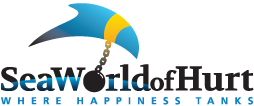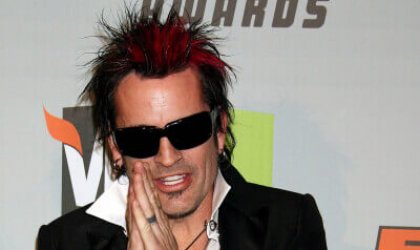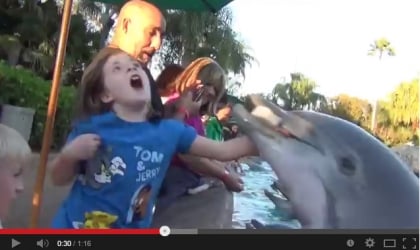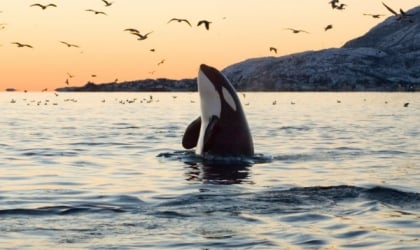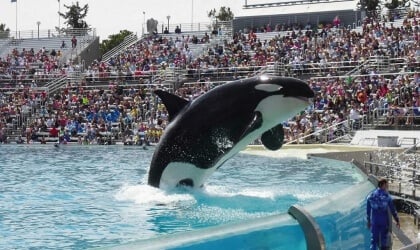Update: New pictures taken last weekend at SeaWorld Orlando by Ocean Advocate News show that Katina’s dorsal injury is either not healing or—at best—healing extremely slowly. She may have sustained a permanent tear to her dorsal fin. Despite that, SeaWorld is still forcing her to perform pointless tricks day after day and has no intention of releasing her to a sea sanctuary where she at least wouldn’t be in danger of sustaining further injuries to her fin from interactions with incompatible tankmates.
 © Heather Murphy, Ocean Advocate News
© Heather Murphy, Ocean Advocate News © Heather Murphy, Ocean Advocate News
© Heather Murphy, Ocean Advocate NewsThe following was originally published on April 2, 2018:
Orca Katina’s dorsal fin was split open—a potentially life-threatening injury—during an interaction with incompatible members of her contrived “pod” at SeaWorld Orlando.
 © Heather Murphy, Ocean Advocate News
© Heather Murphy, Ocean Advocate NewsAs these photos show, the wound is deep and a large chunk of her fin appears to be missing. Orca dorsal fins have an extensive network of blood vessels that help the animals regulate body temperature. And while wild orcas have been known to survive severe trauma to their dorsal fins—such as that caused by being struck by boat propellers—for captive orcas, healing is much harder. Large, open wounds make them particularly susceptible to infections from environmental pathogens. And infections are the leading cause of death among captive orcas. Katina’s life depends on the wound’s successful healing.
 © Heather Murphy, Ocean Advocate News
© Heather Murphy, Ocean Advocate NewsSeaWorld is falsely claiming that such interactions between orcas are “a natural behavior we’d expect to see.” But the company likely knows that aggression is rarely observed in podmates in the wild. Captive orcas commonly fight because members of different pods have been taken from their homes and families and crammed into tiny concrete tanks under stressful conditions with strangers who usually don’t even speak the same dialect.
In nature, Katina would be overseeing a family unit comprising several generations of her male and female offspring. She’d teach her pod to navigate vast ocean terrain, speak a distinct dialect all its own, and find food in times of scarcity.
 © Heather Murphy, Ocean Advocate News
© Heather Murphy, Ocean Advocate NewsAt SeaWorld Orlando, her “pod” consists of only three immediate offspring—one of whom is the result of inbreeding with her son and another of whom is a grandson, who wouldn’t normally live closely with his paternal grandmother in the wild. The remaining two “pod” members—including Malia, who is suffering from an infection that has caused lesions on her body—are completely unrelated.
Learn more about cruelty at SeaWorld on The PETA Podcast:
Listen to more episodes on iTunes, Stitcher, and Spotify! Subscribe for new episodes.
PETA Foundation Supervising Veterinarian Dr. Heather Rally released this statement to the media:
SeaWorld conveniently claims to keep orcas in cohesive family pods, but in reality, this matriarch orca is held in a tiny concrete tank with five other orcas—only three of whom are related to her—and suffered immensely when a large chunk of her dorsal fin was ripped out. While aggression is rarely seen among family units in the wild, traumatic wounds such as Katina’s are an all-too-common consequence when complex wild animals are forced to live in unnatural, incompatible groups inside tiny tanks. As her life depends on whether or not this serious wound heals, PETA is once again calling on SeaWorld to send the orcas to seaside sanctuaries, where they may live safer, more natural lives.
 © Heather Murphy, Ocean Advocate News
© Heather Murphy, Ocean Advocate NewsPETA is lodging a complaint and demanding that the U.S. Department of Agriculture investigate for possible violations of the federal Animal Welfare Act. We’ll also protest outside SeaWorld Orlando on Tuesday at 12 noon to demand that SeaWorld retire the animals it holds captive to seaside sanctuaries, where they can live a more natural life while benefiting from human care for as long as they may need. Orlando residents are encouraged to attend the demonstration, and we ask everyone to tell SeaWorld to empty its tanks now.
